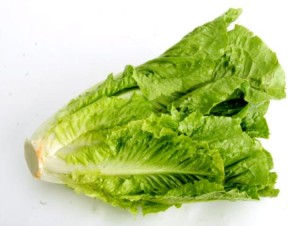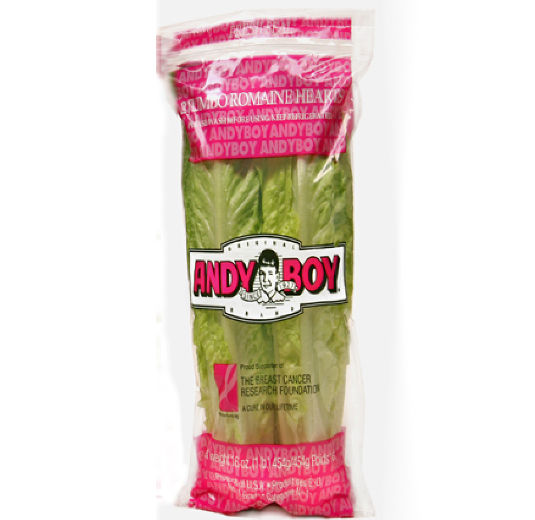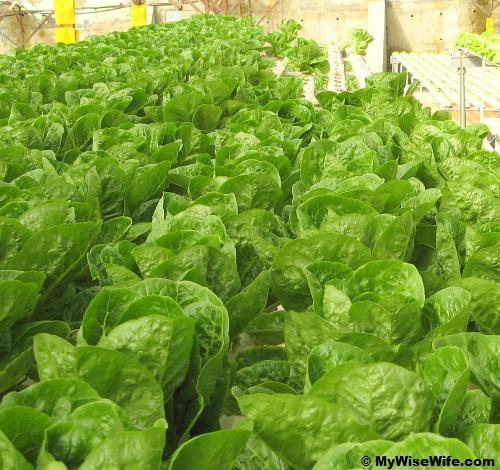A day after Missouri health types announced the source of the Schnucks-salad-bar-related E. coli O157 outbreak may never be found, the feds announced they found a source.
The U.S. Centers for Disease Control (CDC) reported today that as of Dec. 4, 2011, 60 persons infected with the outbreak strain of E. coli serotype O157:H7 had been reported from 10 states.
Collaborative investigative efforts of state, local, and federal public health and regulatory agencies indicate that romaine lettuce is the likely source of illnesses in this outbreak, and .jpeg) contamination likely occurred before the product reached retail stores.
contamination likely occurred before the product reached retail stores.
CDC called Schnucks Chain A, and the farm the lettuce was traced to Farm A, without saying in what state the lettuce originated. But one of the Missouri health types did, saying a grower in California was suspected of being connected but records were “insufficient to complete the picture.”
The public reporting of this outbreak reeks of the Leafy Greens Cone of Silence – that the most noticeable achievement since the California Leafy Greens Marketing Agreement was created in the wake of the 2006 E. coli O157-in-spinach mess is the containment cone of silence that has descended upon outbreaks involving leafy greens.
Things didn’t sound quite right back on Oct. 28, 2011, when St. Louis County health officials first publicly confirmed that the source of the E. coli O157 strain that had sickened 23 people was foodborne, but that the investigation was ongoing. Though retailers have not been asked to pull any food, Schnucks voluntarily replaced or removed some produce in salad bars and shelves, beginning Oct. 26, 2011.
"Once we heard that the health department had declared an outbreak, we took some proactive steps with our food safety team to switch products out that recent history told us could be potential sources," said Schnucks spokeswoman Lori Willis.
A Schnucks store, Culinaria in downtown St. Louis, put a sign up on empty shelves that read in part, "Due to a voluntary recall on pre-packed lettuce, we will not be able to produce these pre-made salads. Be assured quality is our main concern. All of the lettuce on the salad bar is fresh and not involved with the recall."
As a retailer, Schnucks drew my attention earlier this year when it announced it was expanding its so-called Peace of Mind initiative from pricing to quality assurance with a new website, www.peaceofmindquality.com, that emphasizes the chain’s dedication to quality and food  safety. Unfortunately, quality and safety are seemingly used interchangeably on the website when they are actually two different concepts.
safety. Unfortunately, quality and safety are seemingly used interchangeably on the website when they are actually two different concepts.
A table of leafy green related outbreaks is available at http://bites.ksu.edu/leafy-greens-related-outbreaks.
I’m not feeling peace of mind.
More from the CDC report:
As of December 4, 2011, 60 persons infected with the outbreak strain of E. coli O157:H7 have been reported from10 states. The number of ill persons identified in each state is as follows: Arizona (1), Arkansas (2), Georgia (1), Illinois (9), Indiana (2), Kansas (3), Kentucky (1), Minnesota (3), Missouri (37), and Nebraska (1).
Among persons for whom information is available, illnesses began from October 10, 2011 to November 4, 2011. Ill persons ranged in age from 1 to 94 years, with a median age of 29 years old. Sixty-three percent were female. Among the 45 ill persons with available information, 30 (67%) were hospitalized, and 2 developed hemolytic uremic syndrome (HUS). No deaths have been reported.
Collaborative investigative efforts of state, local, and federal public health agencies indicate that romaine lettuce sold primarily at several locations of a single grocery store chain (Chain A) was the likely source of illnesses in this outbreak. Contamination likely occurred before the product reached grocery store Chain A locations.
Ill persons reported purchasing salads from salad bars at grocery store Chain A between October 5 and October 24, 2011. A total of 9 locations of grocery store Chain A were identified where more than one ill person reported purchasing a salad from the salad bar in the week before becoming ill. This included 2 separate locations where 4 ill persons reported purchasing a salad at each location. For locations where more than one ill person reported purchasing a salad from the salad bar and the date of purchase was known, dates of purchase were all within 4 days of other ill persons purchasing a salad at that same location. Chain A fully cooperated with the investigation and voluntarily removed suspected food items from the salad bar on October 26, 2011, out of an abundance of caution. Romaine lettuce served on salad bars at all locations of grocery store Chain A had come from a single lettuce processing facility via a single distributor. This indicates that contamination of romaine lettuce likely occurred before the product reached grocery store Chain A locations.
The FDA and several state agencies conducted traceback investigations for romaine lettuce to try to identify the source of contamination. Traceback investigations focused on ill persons who had (1).jpg) eaten at salad bars at several locations of grocery store Chain A and ill persons at university campuses in Minnesota (1 ill person) and Missouri (2 ill persons). Traceback analysis determined that a single common lot of romaine lettuce harvested from Farm A was used to supply the grocery store Chain A locations as well as the university campus in Minnesota during the time of the illnesses. This lot was also provided to a distributor that supplied lettuce to the university campus in Missouri, but records were not sufficient to determine if this lot was sent to this university campus. Preliminary findings of investigation at Farm A did not identify the source of the contamination. Farm A was no longer in production during the time of the investigation.
eaten at salad bars at several locations of grocery store Chain A and ill persons at university campuses in Minnesota (1 ill person) and Missouri (2 ill persons). Traceback analysis determined that a single common lot of romaine lettuce harvested from Farm A was used to supply the grocery store Chain A locations as well as the university campus in Minnesota during the time of the illnesses. This lot was also provided to a distributor that supplied lettuce to the university campus in Missouri, but records were not sufficient to determine if this lot was sent to this university campus. Preliminary findings of investigation at Farm A did not identify the source of the contamination. Farm A was no longer in production during the time of the investigation.
 During a 16-month period (August 2010 through December 2011), coliform and E. coli counts were enumerated on Petrifilm, and the presence of E. coli O157:H7 and the virulence gene eae was evaluated by real-time PCR (qPCR). Over half (400 of 720) of the lettuce samples were processed with an immunomagnetic separation step before the qPCR assay. All retail lettuce samples were negative for E. coli O157:H7 when tested with the R.A.P.I.D. LT qPCR targeting a region of the O-antigen, and only two (0.28%) were positive for the eae gene when tested with LightCycler qPCR.
During a 16-month period (August 2010 through December 2011), coliform and E. coli counts were enumerated on Petrifilm, and the presence of E. coli O157:H7 and the virulence gene eae was evaluated by real-time PCR (qPCR). Over half (400 of 720) of the lettuce samples were processed with an immunomagnetic separation step before the qPCR assay. All retail lettuce samples were negative for E. coli O157:H7 when tested with the R.A.P.I.D. LT qPCR targeting a region of the O-antigen, and only two (0.28%) were positive for the eae gene when tested with LightCycler qPCR.
 cases of E. coli O157:H7 in the city, according to Micaella’s mother, Victoria Boer.
cases of E. coli O157:H7 in the city, according to Micaella’s mother, Victoria Boer.
.jpeg) contamination likely occurred before the product reached retail stores.
contamination likely occurred before the product reached retail stores. safety. Unfortunately, quality and safety are seemingly used interchangeably on the website when they are actually two different concepts.
safety. Unfortunately, quality and safety are seemingly used interchangeably on the website when they are actually two different concepts.(1).jpg) eaten at salad bars at several locations of grocery store Chain A and ill persons at university campuses in Minnesota (1 ill person) and Missouri (2 ill persons). Traceback analysis determined that a single common lot of romaine lettuce harvested from Farm A was used to supply the grocery store Chain A locations as well as the university campus in Minnesota during the time of the illnesses. This lot was also provided to a distributor that supplied lettuce to the university campus in Missouri, but records were not sufficient to determine if this lot was sent to this university campus. Preliminary findings of investigation at Farm A did not identify the source of the contamination. Farm A was no longer in production during the time of the investigation.
eaten at salad bars at several locations of grocery store Chain A and ill persons at university campuses in Minnesota (1 ill person) and Missouri (2 ill persons). Traceback analysis determined that a single common lot of romaine lettuce harvested from Farm A was used to supply the grocery store Chain A locations as well as the university campus in Minnesota during the time of the illnesses. This lot was also provided to a distributor that supplied lettuce to the university campus in Missouri, but records were not sufficient to determine if this lot was sent to this university campus. Preliminary findings of investigation at Farm A did not identify the source of the contamination. Farm A was no longer in production during the time of the investigation. lettuce for foreign objects.
lettuce for foreign objects. Freshway Foods recalled romaine lettuce products
Freshway Foods recalled romaine lettuce products.jpg) In the wake of the E. coli O145 outbreak in romaine lettuce, a laboratory in Ohio started testing bags of romaine and found another E. coli which lead to a very private recall on Friday.
In the wake of the E. coli O145 outbreak in romaine lettuce, a laboratory in Ohio started testing bags of romaine and found another E. coli which lead to a very private recall on Friday. Bob LaMendola of the Florida Sun Sentinel writes
Bob LaMendola of the Florida Sun Sentinel writes Cross-contamination was unlikely in this scenario because students in different states got sick at the same time, and investigators said early on that beef was an unlikely vehicle.
Cross-contamination was unlikely in this scenario because students in different states got sick at the same time, and investigators said early on that beef was an unlikely vehicle. The recall comes after FDA informed Freshway Foods the afternoon of Wednesday, May 5 that a previously unopened product sample in a New York state laboratory tested positive for the bacteria. Freshway Foods traced the entire lot of romaine products and is advising customers to cease use and distribution of it immediately. This recall may be linked to an outbreak investigation in New York, Michigan, and Ohio.
The recall comes after FDA informed Freshway Foods the afternoon of Wednesday, May 5 that a previously unopened product sample in a New York state laboratory tested positive for the bacteria. Freshway Foods traced the entire lot of romaine products and is advising customers to cease use and distribution of it immediately. This recall may be linked to an outbreak investigation in New York, Michigan, and Ohio.